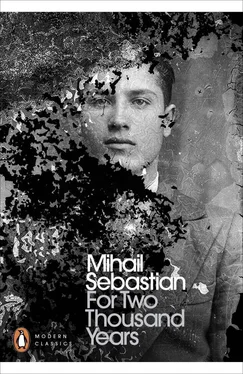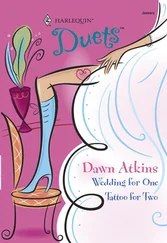‘Why are you looking at me that way, Maurice?’ asks Suzanne, surprised.
‘What way?’
‘I don’t know; worried, perhaps.’
‘Oh, it’s nothing. I thought you’d coughed.’
‘Yes, I had something stuck in my throat.’
‘Just as well it was nothing. It seemed suspicious.’
‘Suspicious?’
‘What are you getting alarmed about? It was imprudent of me to say anything. You won’t give me any peace now. Now I’m sure you think you have tuberculosis.’
‘No Maurice — but, anyhow, if you say …’
‘Know what? How about you pop into the hospital tomorrow and we’ll do an X-ray. To put your mind at rest.’
Three days later, Suzanne leaves for Savoy, advised to spend a month in the sun on a deck-chair. Of course, the X-ray showed two or three lesions.
Maurice Buret gives a modest laugh.
Is he a corrupter? No. He has nothing in common with Gide, neither vice nor proselytizing nor disquiet. No, particularly not disquiet. People — whether they fall or are saved — matter little to Buret.
‘I trouble myself only to vary as much as I can the psychological vistas open to me. I have the impression Robert and Jacques would be a very good combination. So I’ll try to facilitate bringing them together, to smooth the road, to clarify their own vocation. It’s a small effort, behind the scenes.’
I listen to Maurice and make a serious effort not to be scandalized. I should understand once and for all that this man has no moral scruples and therefore should be accepted in his totality. Or rejected in his totality, which I find even harder.
His spiritual patron (if the term ‘spiritual’ can be applied to him) isn’t Gide, but Laclos, and the moral atmosphere he lives in closely resembles that of Les Liaisons dangereuses , which is libertine rather than perverse, because it is not vice that dominates, but the intellectual appetite for always coming up with amusing games.
*
Only after an absence of several weeks (one of those mysterious trips, from which he returns with surprising personal reports), do I realize what Buret’s friendship means to me. He brings with him the daring sense that everything is possible in life, that all women are for the conquering, all doors to be opened. Something odd: though I know him to be cautious, methodical and reflective in everything he does, he still gives the impression of living spontaneously.
‘You even simulate spontaneity, my dear Maurice.’
‘I don’t simulate: I organize. I organize my spontaneity. You take me for a cynic, but I’m an enthusiast. It’s just that my enthusiasm is systematic.’
An hour of conversation with him is a personal lesson in clarity. A term must be found for every nuance, a corrective for every misunderstanding. ‘Everything can be defined,’ he stubbornly believes, and does not forgive a single ill-chosen word or ill-defined distinction. I’ve never heard him pass a vague judgement on anything, be it a woman or a piece of music or a painting. He will always tell me exactly what he likes or doesn’t, strictly maintaining the distinction between one nuance and another.
In his company, life becomes clear-cut, correctly proportioned, the horizons visible.
The offices of Ralph T. Rice in Boulevard Haussmann are barely a modest agency compared to the head offices in Piaţa Rosetti in Bucharest. A few rooms, some desks, a small archive in the process of being organized. I don’t know exactly what old Ralph wants to set up here: a simple sales office or a public company. It’s up to him to decide whether or not we get working on the Le Havre project. (I’d prefer Dieppe, however, which seems to me more suitable for commerce, and from the construction standpoint is immeasurably more open and spacious. I’ve sent a number of plans to the master, who’ll decide.) He may in the end do nothing. It’s not the moment for heavy investment in a business that, even if all goes well, won’t turn a profit for several years at least. At the end of 1929, when Rice Enterprises Inc. began to realize old Ralph’s age-old plan of establishing a French division, the project seemed feasible. Today, in 1931, it’s risky at best, and perhaps even foolhardy. Petrol is suffering a crisis matched only by agriculture. Rice is a daring businessman, but not one to play the stock markets.
The master has never really taken seriously what we in the office term ‘the French expedition’, though he still would have liked to be able to build here and had no reason to discourage Rice. Also, he was happy to give both Dronţu and I the chance to go abroad for a year. We drew straws and I was first.
‘Good: you go this year, next year Dronţu.’
It’s been about a year now. I waited for Marin to take my place, but he hasn’t come. He sent me a letter exactly four lines long, the first I’ve received since his wedding.
‘I can’t come. Married man, too tied up. Good luck over there. I miss you, pal, and wish I could see you. Marjorie sends her regards. She’ll write to you one of these days.’
She’ll write to you one of these days. No, Marjorie won’t write. I know it, and so does Marin.
So, one more year.
*
At the office on Boulevard Haussmann, I sometimes run into Pierre Dogany. He’s doing a doctorate in public and company law here. He struggled as much as he could in Budapest and left when he saw it wasn’t working out. Though he intends to return there as soon as he’s completed his thesis. He’s determined to be a Hungarian whatever it costs, whatever it takes. His excess of zeal bores me. I sense he regrets that letter he sent me two years ago in Bucharest. He doesn’t forgive me for remembering so well his disillusionment with being Hungarian. He wishes he’d never complained to me of having to put up with being persecuted, oppressed and hounded, and having the very fact of being a Hungarian questioned. This relentless devotion seems excessive to me.
He invited me to the university last week, to hear a paper at Lapradelle’s seminar on international law. He spoke about the legal side of the affairs of those who opted for Romania and, as Lapardelle was legal adviser to the Hungarians at The Hague, the whole meeting was an indictment of the Romanian side of the argument. I felt bad and though I lacked the hard information, dates, figures, I felt the need for a counter-argument. To my delight, it was made by a Romanian student in the hall who, once Dogany had finished his lecture, took the lectern and spoke from there for a full half-hour, his eyes flashing at times with a passion such as has probably never been seen in that cold lecture hall.
I went up to him on the way out to introduce myself.
He introduced himself to me as Saul Berger. I was almost repelled by the facile symbolism of this, too obvious to ignore, and too melodramatic for my taste: two Jews fighting each other for nothing more than abstract victories. Destiny, inevitable destiny.
*
Blidaru asks me in his last letter when I plan to return home. He has reserved a site in Snagov through the teachers’ association and he’d like me to build him a house there.
I replied par avion .
‘I don’t know when I’ll be back, but when I am it’ll be I who builds the house. Wait, professor. You’ll have to. It’s too great a pleasure for me to miss.’
Maurice Buret returned yesterday from Normandy, where he had, at Oizy-sur-Glaive, a 25-day sojourn. He’s happy with the harvest he’s brought back, so happy that he’s renounced the usual modest smile with which he usually excuses his victories. He had two successes in Oizy, both of them beauties, and he now animatedly but methodically recounts them to me, in numbered chapters.
Читать дальше












